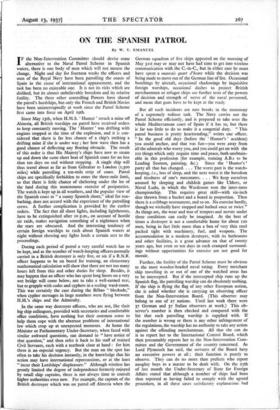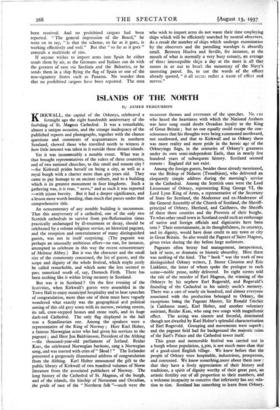ON THE SPANISH PATROL
By W. V. EMANUEL
IT the Non-Intervention Committee should devise some alternative to the Naval Patrol Scheme in Spanish waters, there is one body of men which will not mourn the change. Night and day for fourteen weeks the officers and men of the Royal Navy have been patrolling the coasts of Spain in the cause of international appeasement, and the task has been no enjoyable one. It is not its risks which are disliked, but its almost unbelievable boredom and its relative futility. The three other controlling Powers have shared the patrol's hardships, but only the French and British Navies have been uninterruptedly at work since the Patrol Scheme first came into force on April 19th.
Since May 13th, when H.M.S. ' Hunter' struck a mine off Almeria, all British warships on patrol have received orders to keep constantly moving. The ' Hunter' was drifting with engines stopped at the time of the explosion, and it is con- sidered that there is far less chance of a ship's striking a drifting mine if she is under way ; her bow wave then has a good chance of deflecting any floating obstacle. The result of this order is that His Majesty's ships have now to steam up and down the same short beat of Spanish coast for no less than ten days on end without stopping. A single ship will thus travel about as far as from Gibraltar to London (1,3oo miles) while patrolling a ten-mile strip of coast. Patrol ships are specifically forbidden to enter the three-mile limit, so that there is little chance of sheltering under the lee of the land during this monotonous exercise of peripatetics. The watch is kept up in all weathers, and the popular view of the Spanish coast as " a sunny Spanish shore," ideal for sun- bathing, does not accord with the experience of the patrolling crews. A further complication is provided by the curfew orders. The fact that all shore lights, including lighthouses, have to be extinguished after 10 p.m., on account of hostile air raids, makes navigation something of a nightmare when the stars are obscured. And the interesting tendency of certain foreign warships to rush about Spanish waters at night without showing any lights lends a certain zest to the proceedings.
During each period of patrol a very careful watch has to be kept, and as the number of watch-keeping officers normally carried in a British destroyer is only five, or six if a R.N.R. officer happens to be on board for training, an elementary mathematical calculation will show that there are not too many hours left from this and other duties for sleep. Besides, it may happen that an officer who has spent long hours on a very wet bridge will come below, not to take a well-earned rest, but to grapple with codes and cyphers in a reeling ward-room. This was certainly the case during the Bilbao " blockade," when cypher messages in large numbers were flying between H.M.'s ships and the Admiralty.
In the same way destroyer officers, who are not, like their big ship colleagues, provided with secretaries and comfortable office conditions, have nothing but their common sense to help them cope with the abstruse problems of international law which crop up at unexpected moments. At home the Minister or Parliamentary Under-Secretary, when faced with similar awkward questions, can demand to " have notice of that question," and then refer it back to his staff of trained Civil Servants, each with a textbook close at hand : for him there is no especial urgency. But the man on the spot has often to take his decision instantly, in the knowledge that his action may have international repercussions, or at the least " incur their Lordships' displeasure." Although wireless has greatly limited the degree of independence formerly enjoyed by small ship captains, there is not always time to consult higher authorities even now. For example, the captain of the British destroyer which was on patrol off Almeria when the German squadron of five ships appeared on the morning of May 31st may or may not have had time to get into wireless communication with the C.-in-C., but in either case he must have spent a mauvais quart d'heure while the decision was being made to move out of the German line of fire. Occasional bombings by aircraft, occasional shadowings by inquisitive foreign warships, occasional dashes to protect British merchantmen or refugee ships are further tests of the powers of decision and strength of nerve of the naval personnel, and mean that guns have to be kept at the ready.
But all such incidents are rare breaks in the monotony of a supremely tedious task. The Navy carries out the Patrol Scheme efficiently, and is prepared to take over the whole Mediterranean coast of Spain if it has to, but there is far too little to do to make it a congenial duty. " This patrol business is pretty heartrending," writes one officer. " In the good old days (before the ' Hunter's ' accident) you could anchor, and that was fun—you were away from all the admirals who worry you, and you could get on with the 101 things which only require time and peace, both unobtain- able in this profession (for example, training A.B.s to be Leading Seamen, painting, &c.). Since the ' Hunter's' party all that has changed. . . . The worst part is the watch- keeping, i.e., loss of sleep, and the next worst is the boredom and tiredness of one's messmates. . . . We keep ourselves amused by sleeping and childish games like Ukkers, or Naval Ludo, in which the Wardroom won the inter-mess championship. This requires great skill—with six-inch dice thrown from a bucket and a board in proportion. Then there is a cribbage tournament, and so on. No exercise hardly, though we wickedly have stopped and bathed once or twice." As things are, the wear and tear of tempers and nerves under these conditions can easily be imagined. At the best of times a destroyer is not a comfortable home for about 120 men, being in fact little more than a box of very thin steel packed tight with machinery, fuel, and weapons. The accommodation in a modern destroyer, with its bathrooms and other facilities, is a great advance on that of twenty years ago, but even so ten days in such cramped surround- ings without opportunities for exercise are not good for morale.
Further, the futility of the Patrol Scheme must be obvious to the most wooden-headed naval rating. Every merchant ship travelling in or out of one of the watched areas has to be intercepted. But if the intercepted ship runs up the Spanish flag, the patrolling warship can do absolutely nothing. If the ship is flying the flag of any other European nation, she is asked whether she is carrying an observing officer from the Non-Intervention Board. (This observer may belong to one of 27 nations. Until last week there were 37 German and 37 Italian observers at work.) This ob- server's number is then checked and compared with the list that each patrolling warship is supplied with. If the number is wrong or there is any other infringement of the regulations, the warship has no authority to take any action against the offending merchantman. All that she can do is to report her to the International Control Board, which then presumably reports her to the Non-Intervention Com- mittee and the Government of the country concerned. As Lord Plymouth has said, the servants of the Board have no executive powers at all ; their function is purely to observe. They can do no more than prefects who report naughty boys to a master to be dealt with. On the 25th of last month the Under-Secretary of State for Foreign Affairs stated that although a number of ships had been thus reported as having failed to comply with the agreed procedure, in all these cases satisfactory explanations had been received. And no prohibited cargoes had been reported. " The general impression of the Board," he went on to say, " is that the scheme, so far as it .goes, is working effectively and well." But that " so far as it goes " conceals a multitude of sins.
If anyone wishes to import arms into Spain he either sends them by air, as the Germans and Italians can do with the greatest of ease via Sardinia and the Balearics, or he sends them in a ship flying the flag of Spain or one of the non-signatory States such as Panama. No wonder then that no prohibited cargoes have been reported. The men who wish to import arms do not waste their time employing ships which will be efficiently searched by neutral observers. As a result the number of ships which undergo examination by the observers and the patrolling warships is absurdly small. Between Huelva and Seville, for instance, at the mouth of what is normally a very busy estuary, an average of three interceptible ships a day at the most is all that comes in or out to break the monotony of the Navy's unresting patrol. So, to use the words of the officer already quoted, " it all seem; rather a waste of effort and nerves."







































 Previous page
Previous page